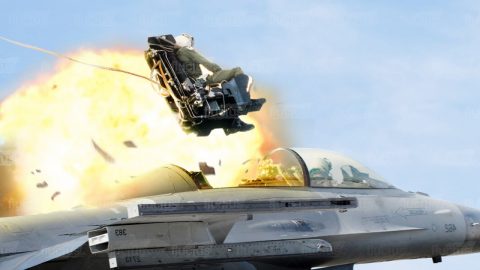
YouTube / Fluctus
Way back when ejection seats weren’t invented yet, pilots were only supplied with their personal parachutes. Depending on the aircraft, the routine of bailing out can vary.
Planes need to be at a specific altitude and speed where the pilot can successfully eject. If not done correctly, it would make it impossible for them to safely eject without injuries.
They can opt to wait at the last second but the technical features of the ejection system might not be able to compensate for their late decision.
Pilots get ample training to handle ejections. In these exercises, they are put in situations where certain movements are needed to be done to properly eject, land, and survive.
Controlled ejections mean pilots are still able to maneuver the plane to somewhere safe and less populated. On the other hand, “Uncontrolled” is when the aircraft is losing a lot of altitude and the pilot is forced to immediately eject.